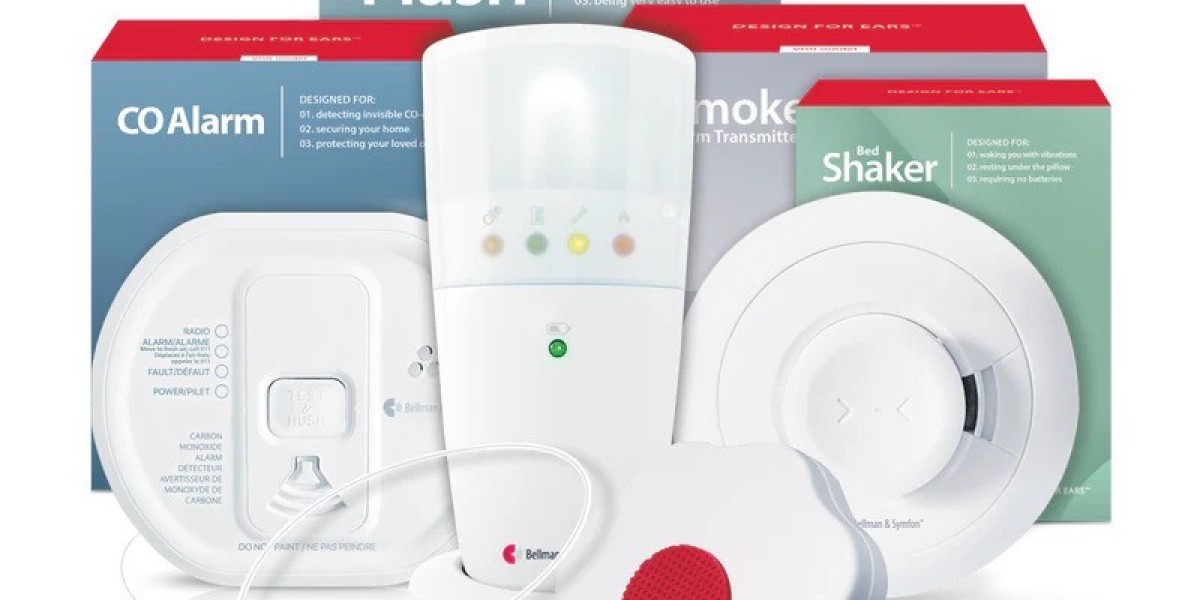Why Hearing Loss Calls for a Different Kind of Smoke Alarm
Most smoke alarms make loud sounds. These alarms help people wake up fast when there is smoke or fire. But not everyone can hear them. People who are deaf or hard of hearing may not hear the warning in time. That can put their lives at risk.
This is why special smoke alarms are made for those with hearing loss. These alarms use lights, vibrations, or bed shakers instead of sound.
What Is a Smoke Alarm for Hearing Impaired People?
A smoke alarm for hearing impaired is designed for people who cannot hear well. It uses strong flashing lights or a bed shaker to alert them. Some models also include a loud sound, in case a person has partial hearing.
If the alarm detects smoke, it sends signals right away. A smoke alarm for hearing impaired is very helpful for homes with deaf family members, seniors, or deep sleepers.
What Is a Smoke Detector for Deaf People?
A smoke detector for deaf works without sound. It uses a flashing strobe light or a bed shaker. These alarms are often linked with an alert system. That system may also connect to other devices like doorbells or baby monitors.
The smoke detector for deaf gives people time to act fast. It helps them get to safety before the smoke spreads.
How Does a Smoke Alarm for Hard of Hearing Work?
A smoke alarm for hard of hearing does not rely only on sound. It may flash a strobe light in bright white. It may also shake your bed or pillow with a special shaker device.
Many alarms have wireless options. You can place them in different rooms. Some connect to mobile apps too. A smoke alarm for hard of hearing makes sure you stay safe in any room.
Why Is This Type of Alarm So Important?
Fires can start at any time. They spread fast. If you do not hear the alarm, you may not wake up or leave in time. A visual or vibrating alert can save lives.
People with hearing loss often sleep without hearing aids. They may not hear a standard alarm. That’s why these specialized alarms are a must in such homes.
Key Features to Look For
Before buying, check for these important features:
Flashing strobe light
Vibrating bed or pillow shaker
Long battery life
Backup battery system
Loud optional tone for partial hearing
Wireless or mobile app connection
You can find these features in many of the best models.
Real Stories from Users
Many users share how helpful these alarms are:
A mother of a deaf teen says the flashing lights helped her daughter feel safe at night.
A senior man with hearing loss now sleeps better, knowing he’ll feel the bed shake if there is danger.
A couple with one deaf partner found peace with a dual-alert system.
These stories show how a smoke detector for deaf can change lives and build confidence.
Where to Place the Alarm in Your Home
Here are a few spots where you should place your alarms:
Bedroom (use a bed shaker or light)
Hallways near sleeping areas
Living room
Kitchen (use a heat alarm instead to avoid false alarms)
Using more than one smoke alarm for hearing impaired helps protect the entire house.
Easy Setup and Maintenance
These alarms are easy to set up. Most are wireless. You can use sticky pads or screws to fix them in place. Battery-powered options are common.
To keep it working well:
Test the alarm once a month
Replace batteries every six months
Clean the unit with a dry cloth
Keep the flashing light free from dust
With regular checks, your smoke alarm for hard of hearing will stay ready to protect you.
Choosing the Right Alarm for You
Here are some tips to pick the best alarm:
Think about how many rooms you need to cover
Decide if you want flashing lights, vibration, or both
Look for ADA-compliant models
Check if the system allows add-ons for more coverage
Choose one with battery backup
You’ll find great models that match your needs and budget.
Smart Technology for Added Safety
Some alarms work with smartphones. They can send a signal to your phone or tablet. Others connect to a pager or alert system. You can even find alarms that link to fire services automatically.
These smart features make a smoke detector for deaf even more helpful, especially if you are alone or live in a large home.
Final Thoughts Before Buying
These alarms are not just useful—they’re life-saving. Fires do not wait. Being ready makes all the difference.
Look for trusted brands. Make sure it meets safety standards. Use alarms that give visual and touch alerts. A smoke alarm for hearing impaired can protect your family, your pets, and your home.
Conclusion
A fire can happen any time. For people with hearing loss, a regular smoke alarm may not be enough. That’s why special alarms with lights and vibration matter. They give everyone a fair chance to wake up and escape in time. Investing in the right system today can save lives tomorrow.






